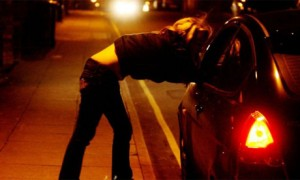She was just 12 years old when she was led into “the life” by her 14-year-old half-sister. After several horrible weeks, she was rescued by police officers — they found her sister in a hotel room, engaged in a sex act with a man, with Leah naked and crouched in a corner, crying hysterically.
What circumstances walked Leah and her sister into this living terror? Did this scenario take place in conjunction with the Super Bowl or another major sporting event? Was her 14 year old sister one of those youngsters featured on Backpage.com as “young and fresh”? Was life at home simply a rehearsal for the abuse the girls would get on the street?
The arm that wrapped around them and pulled them close…the voice that whispered promises of hope and care…the hand that reached out with belonging…they suddenly turned into hot breath and a vice grip. No twisting out of its grasp. The grasp of DEMAND.
Regardless of how they got there, Leah and her sister were taken because young girls are seen as sex plums for the picking-and until there are real consequences for “picking”, there’s no stopping it. DEMAND.
Shared Hope is fighting DEMAND because even one girl is one too many. Our Protected Innocence Initiative is helping to change laws all over the country and bear down on that demand. Since December 1, 2011, when the Protected Innocence Initiative was announced, over 60 state laws have been introduced to address all aspects of the thriving marketplace of children for sale for sex. We applaud leadership in Indiana, host of this year’s Super Bowl, who moved aggressively to pass key anti-trafficking legislation in advance of the event.
And we are grateful to you for your encouragement and your support that have made the Protected Innocence Initiative possible and effective!
 Johns reported that they purchased sex because they were guaranteed submissiveness on the part of the prostituted woman or child. The distinct power imbalance and lack of relationship obligation was noted as a driving factor for those who purchase sex. Many of the johns reported having girlfriends or wives, and say they purchase sex to do the “dirty” sex acts that they would not do with their significant others because these acts could cause her to lose her self esteem. Though sex buyers recognize these distinctions, many commented that the sense of entitlement and degradation towards woman that develops from purchasing sex taints other relationships and their general attitude towards women.
Johns reported that they purchased sex because they were guaranteed submissiveness on the part of the prostituted woman or child. The distinct power imbalance and lack of relationship obligation was noted as a driving factor for those who purchase sex. Many of the johns reported having girlfriends or wives, and say they purchase sex to do the “dirty” sex acts that they would not do with their significant others because these acts could cause her to lose her self esteem. Though sex buyers recognize these distinctions, many commented that the sense of entitlement and degradation towards woman that develops from purchasing sex taints other relationships and their general attitude towards women. In 2008,
In 2008,  To understand why the average age of entry is so young, we must understand the strategy used by pimps. When many people think of sex trafficking, they think of kidnapped children enslaved in a foreign brothel. However, the commercial sexual exploitation of minors occurs in every corner in the U.S. While kidnapping for the purpose of sex trafficking does occur in America, a common tactic used by pimps is trauma bonding. According to
To understand why the average age of entry is so young, we must understand the strategy used by pimps. When many people think of sex trafficking, they think of kidnapped children enslaved in a foreign brothel. However, the commercial sexual exploitation of minors occurs in every corner in the U.S. While kidnapping for the purpose of sex trafficking does occur in America, a common tactic used by pimps is trauma bonding. According to 





